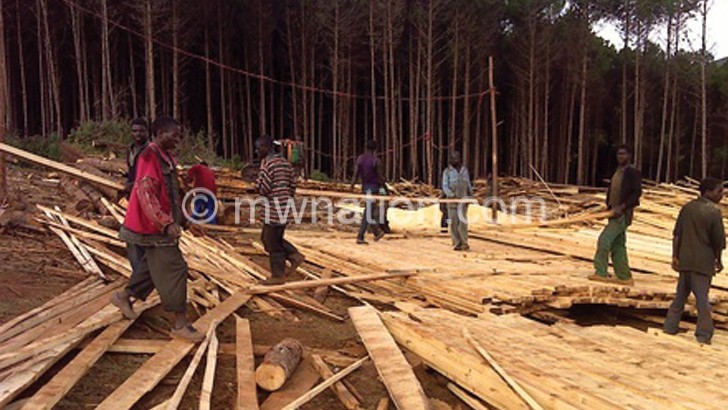Timber millers threaten vigils
Government says it is unfazed by a series of petitions and ultimatums issued by the Reformed Timbers Millers Union (RTMU) to both the President and ministry responsible to allow the union harvest trees in the Viphya Plantation for commercial purposes.
RTMU, a grouping of loggers, recently made statements in the press that they will hold vigils at Forestry headquarters and the ministry, to pressure government to grant them part of Viphya Plantation for commercial logging.

The union alleges that there is favouritism and corruption to some foreign and local companies to operate in the plantation at the expense of Malawians.
However, as a direct reaction to RTMU remarks, director of administration in the ministry Hillary Namainja flanked by director of forestry Clement Chilima and deputy director Teddy Kamoto on Wednesday, in Lilongwe, refuted claims that all commercial timber operators in the plantation were granted licences under dubious means.
Namainja took time to provide background about the situation in the Viphya Plantation. He said in February 1999, Raiply Malawi Limited signed a forest logging concession agreement with government, to manage 20 000 hectares and was granted exclusive rights to fell, extract and convert wood within the concession area and to replant harvested sites. The agreement gave room for amendment of the conditions, whenever parties decided that that was necessary to do so.
He added that Raiply has now replanted nearly 10 000 hectares [Ha] of the bare land and harvested sites, and employs 2 300 people [1 700 permanent]. By the end of the last forest season, only about 730ha were bare in the concession area.
The remaining 33 000ha of the plantation was held for licensed Malawian loggers for sustainable timber harvesting.
According to Namanja, RTMU, who originally traded under Timber Millers Cooperative Union (TMCU), was an umbrella union of seven cooperatives namely Chamatete, Chibwaka, Kalungulu, Lusangazi, Luwawa, Viphya and Zikomo, that were licensed to harvest trees in the plantation.
“Sadly, the operations of TMCU were marred with problems and irregularities due to over-harvesting, failure to replant harvested sites and accumulation of unpaid bills from royalties. As a result, the Department of Forestry terminated the agreement in 2015,” Namainja explained.
However, as part of empowerment to indigenous Malawian businesses, in 2016, the then minister of Natural Resources, Energy and Mining, directed that a fresh agreement be developed with the union, which was renamed RTMU, on understanding that this will enable them to settle outstanding debts and replant harvested sites.
As a way of cementing this partnership, in 2017, RTMU and government jointly drafted a new agreement, with fresh conditions, including reduced area of the concession from 10 000 to 4 000 hectares, and reduced number of members to 35. RTMU submitted a schedule of debt repayment and a 10–year agreement, detailing a sustainable harvesting and replanting schedule.
“The Private Public Partnership Commission (PPPC), Government Contracting Unit and Treasury reviewed the draft management agreement document and expressed some reservations. The PPPC recommended a thorough scrutiny [including capacity and feasibility analysis], prior to signing of the agreement. However, Forestry rejected applications from RTMU for harvesting rights, before a fresh agreement was signed,” Namanja said.
Later, RTMU was registered as a company and signed an agreement with TMCU to take over all responsibilities and obligations in May 2018. The then minister, directed that while vetting of the draft agreement was in process, a special licence be issued to RTMU for harvesting trees in a restricted manner.
A licence was, therefore, issued for harvesting Eucalyptus species of trees in compartment Z95A only, for a year in 2018.
“Unfortunately, by April 2019, all major conditions of the licence were violated by RTMU, such as non-payment of royalties, insufficient replanting in harvested sites and non-settlement of debt in accordance with the agreed schedule.
“In March, 2020, RTMU signed a concession agreement for 4 000 hectares. One of the “conditions precedence” for operationalisation of the agreement was that RTMU will develop and submit a sustainable forest management agreement plan within six months. This has not been done to date,” Namainja lamented.
During an extra-ordinary meeting held to express their grievances by RTMU, with the ministry, which was chaired by Vice-President Saulos Chilima, it was agreed that RTMU shall make a commitment to replant harvested sites, pay upfront for harvested trees and carry out replanting and care of trees in their concession area.
Said Namanja: “Unfortunately, RTMU has not made any commitments, even though this is also a key condition in the operationalisation of the signed concession agreement. So far, as RTMU, the union has planted only about 30 hectares [5 hectares in the last season] and has accumulated an outstanding debt of about K102 million.”
In his reaction to the matter, RTMU president Paul Nthambazale said the initial 10 000 hectares that they were assigned to them only had 2 700 hectares of forest covered with trees “the rest was bare ground”.
“We had 2 700 hectares shared among AKL Timbers, Leopard Matches, Mulli Brothers and seven other cooperatives. Now, if you do mathematics, how much was allocated to each one of us, you will notice that the portion was not enough,” Nthambazale said in a telephone interview.
He added: “Yes, we accrued an original debit of K196 million which comprise of loyalties accrued by the initial union. We did not create this debt ourselves as RTMU, this you must note. However, we have managed to scale down this loan to where it is now [K102 million]. Government can control the agreement with RTMU, as we plan to buy trees on cash basis now.
“We are on the ground. We know what is happening. We are the people that elected this government and put them in power. They need to listen to the views of Malawians, who are the owners of the land.”





